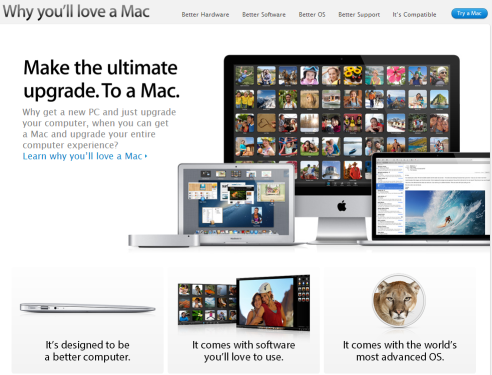The enterprise will never embrace Apple

First in a series. If there is one company that clearly doesn't care about the corporate world, it is Apple. As iOS continues to forge flagship status as Apple's core offering, OS X gets second-class-citizen treatment in every possible way from the Cupertino, Calif.-based company. While the enterprise reluctantly builds out BYOD (bring your own device) initiatives to support usage of Apple devices at the workplace, this is a far stretch from openly embracing iOS or OS X as viable corporate platforms. Apple's presence in the boardroom is due to bottom-up organic acceptance as opposed to top-down purposeful planning.
By even conservative estimates, the enterprise IT market is massive, and growing steadily as the recession continues to recede. IDC recently pinned US corporate IT spending for 2013 at $474 billion, a 6 percent increase over the previous year. And globally, Gartner says that this figure is closer to $2.679 trillion, which represents a 2.5 percent year over year bump. Yet while Apple's sales in phones and tablets continues to stay consistently solid, the company's attitude towards enterprise hasn't changed one bit. For lack of a better description, top Apple executives just "don't care".
Even as iPads and iPhones grace boardrooms around the globe, let's not mistake the true meaning behind this. BYOD programs were put in place to foster a sense of openness and acceptance for technologies that corporate IT refused to support for a bevy of reasons (many of which I'll outline later.) But those who clamor for a sea of Windows devices to be replaced by Macs and iDevices will wait quite a while. You may love to hate Microsoft, but the company represent everything that corporate IT loves: stability, long term product support, flexibility, and standards.
Apple and enterprise IT have had a public hate-hate relationship for some time now. Here's my honest take on the duo's sad state of affairs.
Jobs' Vision for Technology: We Know Best
Steve Jobs is no doubt Apple's greatest (now passed) intellectual asset, and likewise, the biggest obstacle to overcome. Jobs' entire philosophical drive surrounding technology innovation was guided by a tunnel vision mentality that placed form on such a high pedestal, that function always had to take a backseat. You can see it on almost every Apple product today. It's symbolized in Apple's reluctance to use phone connectors on standardized micro USB ports. It's the same reason why you can't buy an Apple notebook that supports a native docking station port. And also the same reason why users can't benefit from self-replaceable batteries in their iDevices.
The enterprise market, and the business world at large, have always tended to embrace technologies that have transparency in repair, port selection, upgrade path, and support options, to name a few. Apple represents the epitome of everything opposite what corporate IT looks for. It's no surprise, then, that Apple's Retina Macbook Pro was labeled the "least repairable laptop ever" by tear-down website iFixit. Apple has a no-compromise viewpoint on form and style, and this overtakes a majority of the devices introduced to market.
It's not like Steve Jobs himself didn't allude to his distaste for big business' IT needs. Before his passing, Jobs shared frank thoughts with the Wall Street Journal:
What I love about the consumer market, that I always hated about the enterprise market, is that we come up with a product, we try to tell everybody about it, and every person votes for themselves. They go ‘yes’ or ‘no’, and if enough of them say ‘yes,’ we get to come to work tomorrow... With the enterprise market, it’s not so simple. The people that use the products don’t decide for themselves, and the people that make those decisions sometimes are confused.
While I agree with Jobs that many C-level execs make decisions that are questionable regarding tech direction, I don't think many CIOs or CTOs would level with that statement. The enterprise market demands many things that Apple just refuses to bow down to: timeframes, consistency, support paths, lifecycles, etc. In fact, if Apple had to develop around being more consistent with these ideals, it would probably tarnish what it represents in the consumer sector today. We all know that is something the company would never dare to touch.
Even Google, the mighty trial-by-fire innovator in the cloud arena, understood these very basic facets of competing in enterprise IT when it went primetime with Google Apps for Business. From its public Status Dashboard on Apps' uptime, to its delivery of two separate (Rapid and Scheduled) release tracks for new features, Google gets corporate IT right for the email platform. Until Apple concedes to corporate missteps, it will likely never gain the trust of business IT management in the short term.
What does Business IT think of Apple?
I definitely don't stand alone in my thoughts on Apple. Industry magazine InformationWeek, which caters to the folks keeping enterprise IT running, ran a great story a few months ago on Apple in the big business sector. It covered a summary of the results that they found in a formal Apple Outlook Survey, which dove into where Apple's acceptance in the business world currently sits and where it's headed.
What kind of things did BW discover? Here are some of the most important points culled from 331 IT decision makers, and the results shouldn't be too surprising:
- 64 percent have no Apple servers being used in their organizations
- 47 percent believe Apple's products are too expensive for the value provided
- Only 11 percent rate Apple's product value as "excellent"
- 39 percent say that Apple is making no efforts to improve enterprise support
- Only 11 percent spend more than 20 percent of their IT budgets on Apple gear
- 35 percent dislike the difficulty of integrating Apple gear with existing infrastructure
In Apple's defense, however, more than 90 percent of the same respondents already have support for iPhones/iPads or are planning to do so. And over 80 percent have the same attitude towards Mac laptops and desktops. So again, while the organizations themselves are not rushing to internally purchase and support these devices at large, employees use their BYOD freedoms to introduce Apple into the workplace. While I definitely have no issue with users wishing to use technologies they like, at the same time, the folks that maintain the infrastructures (such as myself) are placed with the burden of wrangling these free-spirited devices into a safe and secure environment. And from my own experience, it's definitely easier said than done.
Another glaring hole with Apple's approach to the enterprise has long been reluctance to natively support Active Directory like its Windows brethren (specifically, Group Policies). Most large businesses today rely deeply on AD to provide basic security and organizational needs surrounding deployed technologies, and Apple's efforts to help OS X-based products to fit into this mold is pathetic at best. Face value support for Active Directory does little to cater to this basic need this day in age.

Even Apple's official "Why Mac?" website has zero reference as to why it's a great platform for the workplace. Apple's perception problem, for better or for worse, is entirely centered around the consumer experience. Apple proves it truly doesn't care about the enterprise.
Perhaps this is part of Apple's official anti-enterprise stance, though. Subtleties are paramount in the Apple universe, and this could very well be the company's way of showing without telling how much it despises the enterprise IT sector. Jobs got his wish, and Apple doesn't give two bucks about what big business thinks of their policies.
On the pricing front, it's tough for many businesses (including the ones my company supports) to justify spending on Apple gear when you can equip roughly two people with Windows devices for the price of one low-end Macbook Pro, for example. The starting price for the lowest Macbook Pro is $1,200 USD (before tax), which doesn't include Office in any form. Likewise, I can turn and look at entry level Dell Vostro laptops for my organization going for $420 a unit (as of 4-10-2013) and get both of them loaded with Office for just slightly more than a single Macbook Pro without Office. And the point of my example isn't to start an apples for apples debate on specs alone -- we all know Apple would win in the above scenario. Let's be realistically mindful that most organizations don't need a BMW for every information worker to get the job done. This is exactly what I'm getting at, and what other CIOs attested to in the InformationWeek study, in that Apple's value proposition is not very appealing.
Managing iDevices is Nothing Less than a Chore
Take a quick look at how IT departments have taken to iOS based devices, namely iPads that are the poster children for the BYOD era. Not a single iOS device can be managed through Active Directory (or any other formal LDAP system, for that matter) yet departments worldwide fill in this oversight gap with third party MDM (mobile device management) tools.
While these third-party solutions are great, and many do work wonders, notice that there is no movement from Apple to help alleviate these management woes. Apple's official stance has been (and probably will be) to keep pushing the agreeably painful "center of gravity" for all things: iOS, iTunes. This is terrible policy if you ask me, or any other IT person, for that matter.
I saw first hand just how lackluster Apple's efforts in the enterprise sector are when I used to work in K-12. Attending educational tech conferences multiple times a year taught me one solid lesson: Apple wants an i-device in every kid's hand, but has no desire to make educators' or technology support staffs' lives any easier in managing the iOS ecosystem.
Ask anyone who has to manage a fleet of iPads for a school without the help of expensive third party MDM software. Apple's loose directives on managing these device "silos" for lack of a better term is mind numbing. Why does app licensing have to be twice as complex as Microsoft's? Why does the Apple Volume Purchase Program still rely on a hard-t0-manage consumer-oriented program such as iTunes? And if iTunes is the de-facto platform to manage iPads, how come none of Apple's bright engineers can figure out a way to natively update and manage more than a single iPad at a time? For a company usually billed as cutting edge, these backend fumbles are more embarrassing than some of Microsoft's recent follies.
But I keep telling myself: An Apple that truly cared would have fixed this mess years ago. iOS device management wouldn't be a chore; it would be as simple and elegant as iCloud in execution. OS X devices would seamlessly fit into any existing AD infrastructure, and companies could ideally make the case for moving to an Apple ecosystem. If this is part of Apple's intentions in any way, they surely don't have a knack for showing it.
Apple's Long Term: Zero Stated Outlook for the Enterprise
Without even having remote access to Apple's 10-year outlook, I can safely say that the lack of appetite in the enterprise e sector is very likely tied to the exponential dominance of iOS device sales as a percentage of revenue for the company as a whole. As much as the legions of Apple fans would yearn for the day Microsoft is dethroned in the enterprise, this is a non-starter for me for a number of reasons.
First, you have to extrapolate the subliminal meanings behind Apple's overall intentions in the tech world. With iOS growing, and OS X sales slowing (or standing still, depending on your sales sources) the desire for Apple to compete in the traditional enterprise market with proper vigor becomes less and less important. In some ways, the forceful approach as the anti-enterprise works to Apple's benefit. They would clearly agree that enterprise as a whole shifting to work around the Apple way of doing things is a sign that they just don't have to conform.
The same goes for Apple's slowing on releases of revised laptops and desktops. While the Macbook laptop line has gotten decent attention the past few years, fans of the Mac Pro tower computer clutch to a nearly 3+ year old design by now -- with just rumor of a revised device coming soon. This is a far cry from the dominating lineup Apple used to run in the Mac laptop/desktop sector.
But this shouldn't be entirely surprising to most folks. Let's not forget that Apple dumped on its enterprise fanclub heavily a few years back when discontinuing the Xserve line out of the blue. Just as some thought Apple was warming up to enterprise and giving deserved attention, the plug is pulled on an arguably solid product which was heading in the right direction. This was no doubt a slap in the face to techies making the case for Apple as a viable alternative to Windows in the workplace.
Here's another possible prospect in five years: what if Apple just stops making traditional computers altogether? Is this really that crazy of a prediction to make? It doesn't take a genius to figure out that when you have a growing majority of your revenue (iOS) overtaking a product line that represents the "old vision" of computing according to Apple (laptops, desktops), some kind of drastic change needs to be made. And seeing how blunt Apple generally is with its market statements, I wouldn't at all be shocked to see OS X 10.x be the last of its breed. In true Xserve fashion, the legacy of the Mac cats may be slowly nearing its digital end.
One must also be slightly suspicious as to why Apple has not made a peep about competing with Microsoft in touch on the traditional laptop and desktop side. After all, Windows 8 has been a public reality for Apple since 2011 when the fuller picture about Microsoft's intentions for 8 were solidifying. We're now full force moving into Spring 2013 and there is zero news about anything remotely touch related making its way to Macbooks or Mac desktops. If Apple plans something spectacular to slow the Windows 8 touch train, it certainly hasn't brushed through any of the traditional leak channels as with most prior releases.
Apple's long had a middle finger raised pointedly at big business. If the company wants to change this perception with us folks in IT, it needs to get serious about the intentions from the ground up. I'm not alone in my grim outlook for Apple in the enterprise, and until I see Apple making treads in the right direction, its products will be relegated to the BYOD policy for the foreseeable future.
Photo Credit: igor.stevanovic/Shutterstock
 Derrick Wlodarz is an IT Specialist that owns Park Ridge, IL (USA) based technology consulting & service company FireLogic, with over 8+ years of IT experience in the private and public sectors. He holds numerous technical credentials from Microsoft, Google, and CompTIA and specializes in consulting customers on growing hot technologies such as Office 365, Google Apps, cloud hosted VoIP, among others. Derrick is an active member of CompTIA's Subject Matter Expert Technical Advisory Council that shapes the future of CompTIA exams across the world. You can reach him at derrick at wlodarz dot net.
Derrick Wlodarz is an IT Specialist that owns Park Ridge, IL (USA) based technology consulting & service company FireLogic, with over 8+ years of IT experience in the private and public sectors. He holds numerous technical credentials from Microsoft, Google, and CompTIA and specializes in consulting customers on growing hot technologies such as Office 365, Google Apps, cloud hosted VoIP, among others. Derrick is an active member of CompTIA's Subject Matter Expert Technical Advisory Council that shapes the future of CompTIA exams across the world. You can reach him at derrick at wlodarz dot net.
